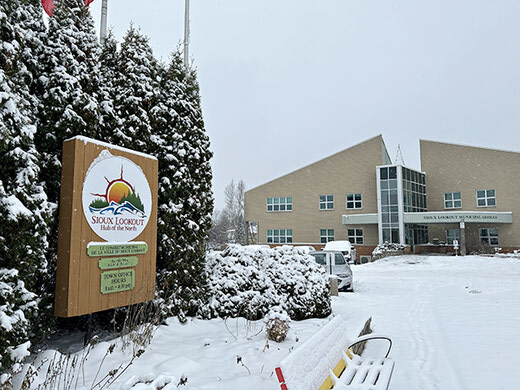Federal Government increasing financial support for winter roads
Tim Brody - Editor
Nishnawbe Aski Nation (NAN) Grand Chief Alvin Fiddler is welcoming new federal commitments to address “the increasing fragility of the winter road network” after meeting with First Nation leadership, Indigenous Services Minister Patty Hajdu, and community members on Nov. 22
in Thunder Bay on winter road planning and climate adaptation strategies.
On Nov. 22, Minister Hajdu hosted a roundtable in collaboration with Nishnawbe Aski Nation (NAN) and other First Nation leaders to discuss the challenges posed by the shortened winter roads season.
Minister Hajdu also announced an additional $20 million in federal funding over four years for winter roads for Ontario First Nations communities. This new funding supplements the $7 million in annual winter road funding already allocated to these communities by the Government of Canada.
“Last winter our Chiefs were forced to declare a state of emergency as unseasonably warm weather threatened the viability of winter roads, and our leaders are concerned that the same will happen this year. I agree with the Minister that this is an all-hands-on-deck moment, and I appreciate her willingness to sit at the table with us and act on these serious issues,” said Grand Chief Fiddler. “In addition to this funding, I am encouraged by the Minister’s commitment to develop a First Nations led road agency. We look forward to beginning this work with full engagement with First Nations communities.”
“Climate change has significantly shortened the window for winter roads to be accessible, leading to shortages of food, fuel, and medical supplies, and increasing reliance in air transport. We are steadfast in our commitment to work closely with partners to find solutions that ensure reliable connectivity to remote communities,” stated Minister Hajdu.
The Federal Government clarified:
- Indigenous Services Canada (ISC) provides over $7 million annually to support 32 remote First Nations in Ontario for the construction, maintenance, and improvement of approximately 3,200 kilometres of winter roads. With today’s announcement of an additional $20 million over four years, this contribution will increase to $11 million annually.
- The Province of Ontario provides up to $6 million annually to First Nations for the construction, operation, and maintenance of winter roads. In 2023–2024, the Province introduced a $5 million annual program to improve winter road infrastructure, including enhancements to water crossings such as bridges and culverts.
- Budget 2024 allocated $45 million for the Berens River Bridge and Roads Project, which will connect Pikangikum to the provincial highway and strengthen the winter road network to six other communities: Poplar Hill First Nation, McDowell Lake First Nation, Deer Lake First Nation, North Spirit Lake First Nation, Sandy Lake First Nation, and Keewaywin First Nation.
NAN shared that the announcement was made following the Winter Roads Roundtable with representatives from across NAN territory, partners and stakeholders. “It commits $20 million over four years, matching Government of Ontario funding for the construction of bridges and culverts to ensure safer and more reliable access to remote communities,” NAN shared.
“The Government of Ontario does provide much-needed funding to support the winter road network, but I am disappointed that provincial political leaders were not here today. We are still in a state of emergency. Many of the issues we are discussing require the province to be at the table. They are part of the ongoing discussions we need to have, and we expect their participation,” said Grand Chief Fiddler.
NAN explained in a Nov. 22 media release that, “The Winter Road Network in the Far North of Ontario consists of two all-season roads and eight winter road corridors. The two all-season roads are the Nungesser Road, leading from Red Lake to the Berens River, and the Pickle Lake Road (NORT Road). Historically, the Pickle Lake Road provided access to the Township of Pickle Lake and Musselwhite Mine, terminating at Windigo Lake. This road now extends to Weagamow (North Caribou Lake First Nation) as a result of a bridge installation. Two additional winter road corridors connect communities
further South.
“More than 30 First Nation communities in Ontario are remote, with no year-round access to urban centers where essential goods and services are obtained. Winter roads serve as a vital lifeline, linking these communities to the Ontario Provincial highway network. However, this lifeline is increasingly under threat from climate change.”
NAN shared, “The impacts of climate change have significantly shortened the winter road season, reducing it from an average of 77 days to as few as 28 days – or even less in some regions. These changes have also increased the need for frequent maintenance to ensure safety and have increased the demand for infrastructure such as bridges and culverts at water crossings.
“To date, no comprehensive or systematic assessment has been completed to understand the specific vulnerabilities of Ontario’s winter road network to climate. In addition to climate-related challenges, remote communities face recurring issues with winter roads, including safety concerns, inadequate funding, and the ongoing need for maintenance. These compounded difficulties highlight the urgent need for sustainable solutions to preserve this essential connection.”
NAN hosted the Northern Roads Summit: Building a Resiliency in a Changing Climate in October 2023.
“The Summit was part of an ongoing and decades-long process to improve winter roads management, given their importance to remote communities. These concerns relate to increasingly challenging winter road operability due to climate change, construction, maintenance, safety, and funding. The Summit was attended by northern remote community members, provincial and federal government partners and technical experts who offered presentations.”
Key findings from the summit were:
- Ontario’s approach to addressing climate change threats to the winter roads system remains reactive and piecemeal.
- Enhancing the climate resiliency of the transportation network in the Far North demands a radical change in the funding model.
- Ontario lacks mandatory winter road technical and safety standards, creating safety liabilities for winter road construction and road users.
- Winter road funding has increased at a rate of 0.6% per year, compared to a 2022 inflation rate of 6.8%.
- The current winter road permitting system is fragmented and complex.
NAN shared that the following recommendations were developed from a review of past roads forums (2005-2023), literature review, interviews and a 2008 feasibility study by Nishnawbe Aski Development Fund on winter road governance:
- Immediate funding reform was identified as a top priority by delegates in attendance as there is currently inadequate funding for the construction and maintenance of the winter roads. Current funding has not kept up with rising inflation rates, and the cost of fuel alone as increased substantially in remote communities, in addition to rising equipment and associated maintenance costs. Increased funding will be necessary as remote communities adapt to climate change.
- First Nations led Road Agency to coordinate strategic planning, funding advocacy, permitting and the development of technical & safety standards for the winter road system.
- Complete a comprehensive assessment of Far North Transportation system vulnerabilities, integrating both scientific and traditional knowledge in collaboration with remote communities and winter road users.
- Embed climate change impacts into all policy, planning, funding, and decision-making processes for winter and all-season road networks.
- Establish a one-window, streamlined provincial and federal environmental assessment and permitting process for roads and water crossings.
- Improve traffic safety immediately by working with the Ontario Ministry of Transportation and commercial transport companies to enhance safety practices.
The Municipality of Sioux Lookout is planning for the future and is inviting local residents to join in the conversation...



